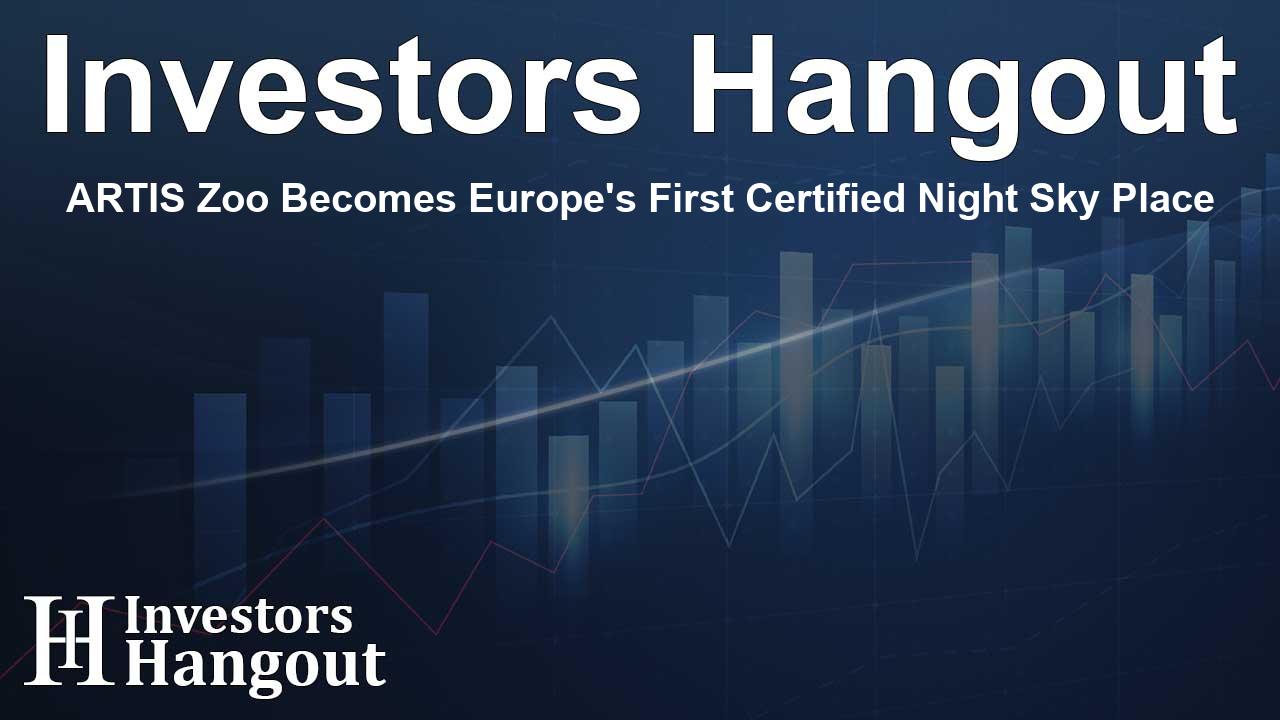ARTIS Zoo Becomes Europe's First Certified Night Sky Place

ARTIS Zoo's Recognition as an Urban Night Sky Place
Next to a Red Light District, Amsterdam is now home to a No Light District.
In a significant milestone, Royal Zoo ARTIS has been certified as an Urban Night Sky Place by DarkSky International. This recognition marks ARTIS as the first location in the heart of a European capital to earn this prestigious designation and the world's first zoo to achieve such an honor. This certification is a testament to ARTIS's dedication to minimizing light pollution and underscores the essential role of darkness in sustaining both nature and human well-being.
Saving Our Night Sky
From the sky, Amsterdam is a dazzling array of lights. Yet in the heart of this illuminated city lies a unique oasis: ARTIS Zoo, which stands as a sanctuary where true night can be experienced. The tranquility of the park ensures that the zoo's animal residents receive the rest they need. This commitment to preserving nocturnal darkness supports not only the wellbeing of the animals under ARTIS's care but also the urban wildlife that inhabits the surrounding areas.
Contributions to Darkness Awareness
Dan Oakley, a representative from DarkSky International, expressed great enthusiasm about ARTIS’s new status: "It's fantastic that ARTIS has been certified as an Urban Night Sky Place. The zoo’s efforts to protect the night sky in such a brightly lit city and educate the public on its significance is incredibly valuable. This benefits residents, visitors, and animals alike. We hope that other zoos will be inspired by ARTIS and more DarkSky locations will emerge."
The Significance of Darkness
The Netherlands faces severe challenges with light pollution, ranking among the most affected nations globally. Artificial lighting in urban settings grows by approximately 10 percent each year, disrupting natural biological rhythms, causing confusion for wildlife, and adversely affecting human health. In light of this new certification, ARTIS aims to be a powerful advocate for the preservation of darkness, raising awareness concerning the detrimental impact of light pollution on the environment.
Engaging the Public
Starting this winter, ARTIS plans to introduce activities designed for visitors to appreciate the night sky. During special evening openings, a limited group of guests will have the unique opportunity to stroll through the park, experience the stillness of the night, and explore the universe through ARTIS' Planetarium. These initiatives are aimed at creating an immersive experience that reconnects people with nature.
“Darkness plays a vital role in the health of plants, animals, and humans,” explains Savitri Groag, Sustainability Coordinator at ARTIS. “By turning off unnecessary lights, we can help restore nature's biological clock. This certification reinforces the idea that even in a bustling metropolis, the beauty of nocturnal darkness can be preserved.”
Conclusion
This remarkable achievement not only enhances the cultural significance of ARTIS Zoo but also sets a precedent for others to consider the impact of artificial light on wildlife and ecosystems. ARTIS's commitment inspires both local communities and visitor awareness about the inherent value of nighttime and the urgency of darkness preservation.
Frequently Asked Questions
What is an Urban Night Sky Place?
An Urban Night Sky Place is a location recognized for its efforts to protect the quality of the night sky by reducing light pollution.
Why is darkness important for animals?
Darkness is crucial for many animals' biological rhythms and behaviors. It provides a natural environment for resting and hunting.
What initiatives will ARTIS implement for visitors?
Starting in winter, ARTIS plans to host evening events where visitors can enjoy the tranquility of the park and learn about the night sky.
How does light pollution affect human health?
Light pollution can disrupt sleep patterns and biological rhythms in humans, leading to various health issues.
Can other locations become Urban Night Sky Places?
Yes, other zoos and urban areas can seek certification by committing to practices that minimize light pollution and educate the public.
About The Author
Contact Ryan Hughes privately here. Or send an email with ATTN: Ryan Hughes as the subject to contact@investorshangout.com.
About Investors Hangout
Investors Hangout is a leading online stock forum for financial discussion and learning, offering a wide range of free tools and resources. It draws in traders of all levels, who exchange market knowledge, investigate trading tactics, and keep an eye on industry developments in real time. Featuring financial articles, stock message boards, quotes, charts, company profiles, and live news updates. Through cooperative learning and a wealth of informational resources, it helps users from novices creating their first portfolios to experts honing their techniques. Join Investors Hangout today: https://investorshangout.com/
The content of this article is based on factual, publicly available information and does not represent legal, financial, or investment advice. Investors Hangout does not offer financial advice, and the author is not a licensed financial advisor. Consult a qualified advisor before making any financial or investment decisions based on this article. This article should not be considered advice to purchase, sell, or hold any securities or other investments. If any of the material provided here is inaccurate, please contact us for corrections.
